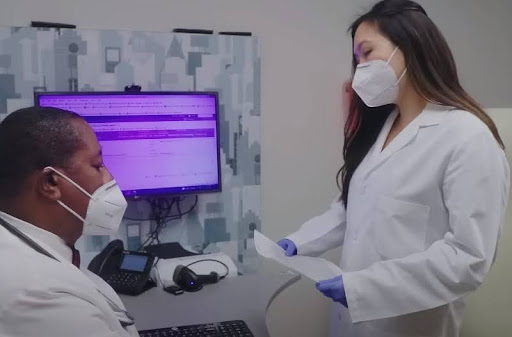Nurse practitioners are highly educated medical professionals equipped with extensive health knowledge and patient care experience. This expertise is highly valued in the job market but takes time to cultivate.
Becoming a nurse practitioner typically requires between six and eight years of education. However, the exact duration depends significantly on your current qualifications and education level. For anyone considering this career, knowing how long does it take to become an NP is a key factor in planning your journey.

In this article, you will be able to know how long does it take to become an NP. Not only that, you will be informed what they do in their professions, their job appearance and how you can be like them.
Understanding a Nurse Practitioner
A Nurse Practitioner (NP) is an advanced practice registered nurse (APRN) who has completed additional education. They train beyond the requirements for a registered nurse (RN).
NPs hold either a Master of Science in Nursing (MSN) or a Doctor of Nursing Practice (DNP) degree, enabling them to take on more responsibilities in patient care. Understanding how long does it take to become an NP helps potential candidates assess the dedication required to achieve these qualifications.
They are licensed to diagnose and treat medical conditions, prescribe medications, and perform procedures, often serving as primary or specialty care providers.

NPs work in various healthcare settings, including hospitals, clinics, private practices, and community health centers. Their role bridges the gap between nurses and physicians, providing high-quality, patient-centered care.
They emphasize health promotion, disease prevention, and patient education, focusing on holistic and personalized care approaches. Due to their advanced skills and training, NPs can manage acute and chronic conditions, interpret diagnostic tests, and develop comprehensive treatment plans.
Their expertise and versatility make them crucial assets in the healthcare system, improving access to care and patient outcomes.
How Long Does it Take to Become an NP?
Becoming a Nurse Practitioner (NP) is a commitment that requires several years of education and training. So, how long does it take to become an NP? The journey typically spans six to eight years, depending on your current qualifications and the educational path you choose.
Here are the key steps and requirements involved:
1. Bachelor of Science in Nursing (BSN) – 4 years:
The first step is obtaining a BSN degree, which generally takes four years. This program includes courses in nursing, anatomy, physiology, microbiology, chemistry, nutrition, and more, along with clinical practice hours.

2. Registered Nurse (RN) Licensure – Variable:
After earning a BSN, you must pass the National Council Licensure Examination (NCLEX-RN) to become a licensed RN. This step can take several months of preparation and waiting for test results.
3. Clinical Experience – 1 to 2 years:
Most NP programs require you to have clinical experience as an RN. Gaining this experience typically takes one to two years, though some students may choose to work longer to enhance their skills.
Master of Science in Nursing (MSN) or Doctor of Nursing Practice (DNP) – 2 to 4 years:
To become an NP, you must complete an advanced degree. An MSN program generally takes two to three years, while a DNP program can take three to four years.
These programs include advanced coursework in health assessment, pharmacology, pathophysiology, and clinical training in your chosen specialty.
4. Certification and Licensure – Variable:
Upon completing your advanced degree, you must obtain certification in your specialty area (family, pediatric, or geriatric care) from a recognized certifying body.
Such as the American Nurses Credentialing Center (ANCC) or the American Association of Nurse Practitioners (AANP). This involves passing a certification exam and meeting specific clinical hour requirements. Knowing how long does it take to become an NP, including the certification process, ensures better planning for aspiring candidates.
In summary, becoming a Nurse Practitioner typically takes six to eight years of education and training after high school. The exact timeline can vary based on individual circumstances, educational choices, and the time taken to gain clinical experience.
How to Become a Nurse Practitioner?
After informing you how long does it take to become an NP, let us inform you of the way to become a nurse practitioner. It’s different from being a midwife. Becoming a Nurse Practitioner (NP) involves a structured path that combines education, clinical experience, and certification. Here’s a step-by-step guide:
- Earn a Bachelor of Science in Nursing (BSN): Begin by completing a BSN program, which typically takes four years. This degree provides foundational knowledge in nursing theory, practice, and clinical skills.
- Obtain RN Licensure: After graduating from a BSN program, pass the NCLEX-RN exam to become a licensed Registered Nurse (RN). This step allows you to gain valuable clinical experience.
- Gain Clinical Experience: Work as an RN to accumulate clinical experience. Most NP programs require at least one to two years of experience, although some may accept less.
- Choose an Advanced Degree: Decide whether to pursue a Master of Science in Nursing (MSN) or a Doctor of Nursing Practice (DNP). An MSN typically takes two to three years, while a DNP can take three to four years. These programs provide advanced coursework in pharmacology, health assessment, pathophysiology, and specialized clinical training.

- Specialize and Certify: Select a specialization such as family practice, pediatrics, or geriatrics. Obtain certification through a recognized certifying body like the American Nurses Credentialing Center (ANCC). Or the American Association of Nurse Practitioners (AANP) by passing a certification exam and meeting clinical hour requirements.
- Obtain State Licensure: After certification, apply for state licensure as an NP. Each state has specific requirements for licensure, so research your state’s regulations.
- Continuing Education: Maintain your NP certification through continuing education and renewal requirements to stay current in the field and maintain licensure.
Overview of Nurse Practitioner Role
Now, you already know how long does it take to become an NP. In this period, they get training and knowledge about a nurse practitioner’s role. Nurse Practitioners (NPs) are advanced practice registered nurses (APRNs) who play a crucial role in healthcare delivery. They are trained to provide comprehensive, patient-centered care, often acting as primary healthcare providers in various settings.
NPs assess patients, order and interpret diagnostic tests, diagnose illnesses, prescribe medications, and develop treatment plans. They emphasize health promotion, disease prevention, and education, working collaboratively with patients to achieve optimal health outcomes.

NPs can specialize in areas such as family practice, pediatrics, geriatrics, acute care, or women’s health. Their scope of practice varies by state regulations but generally includes performing physical exams, managing chronic conditions, and performing minor procedures.
They are trained to work autonomously, making clinical decisions while collaborating with physicians and other healthcare professionals as needed. With advanced education and clinical training, NPs bridge the gap between nursing and medicine, providing accessible and cost-effective care to diverse patient populations.
Their holistic approach to healthcare and focus on preventive care make them invaluable members of the healthcare team, enhancing patient satisfaction and improving healthcare delivery overall.
Job Outlook and Demand for Nurse Practitioners
The job outlook for Nurse Practitioners (NPs) is exceptionally promising. As the demand for healthcare services continues to grow, particularly in underserved rural and urban areas, NPs are increasingly recognized for their ability to provide high-quality, cost-effective care.
According to the Bureau of Labor Statistics (BLS), employment of NPs is projected to grow much faster than the average for all occupations, with an expected increase of 45% from 2020 to 2030.
Factors driving this demand include an aging population requiring more healthcare services. Healthcare reforms expanding access to care, and a shift towards preventive care models that NPs excel in providing.
NPs can expect abundant job opportunities across various healthcare settings, including hospitals, clinics, primary care practices, and specialty care settings. This positive job outlook underscores the critical role NPs play in meeting the evolving healthcare needs of communities nationwide.
Benefits of Becoming a Nurse Practitioner
Becoming a Nurse Practitioner (NP) offers numerous professional and personal benefits.
- Autonomy and Responsibility: NPs have the autonomy to make clinical decisions and manage patient care independently within their scope of practice.
- Competitive Salaries: NPs enjoy competitive salaries that reflect their advanced education and specialized skills.
- Career Flexibility: NPs can choose from various practice settings and specialties, including family practice, acute care, pediatrics, and women’s health.
- Professional Satisfaction: The ability to build strong patient-provider relationships based on continuity of care contributes to professional satisfaction.
- Contribution to Healthcare: NPs play a vital role in improving access to care, particularly in underserved communities, and focus on preventive care, which reduces healthcare costs and improves patient outcomes.
- Job Growth and Demand: The field of Nurse Practitioners is growing rapidly, offering abundant job opportunities across diverse healthcare settings.
- Impactful Role: NPs make a meaningful impact on patient health and well-being by providing comprehensive, patient-centered care.
Final Verdict
Becoming a Nurse Practitioner is not just a career choice but a gateway to a fulfilling and impactful role in healthcare. With a commitment to advanced education, clinical expertise, and patient-centered care, Nurse Practitioners enjoy autonomy, competitive salaries, and diverse career opportunities.
They play a critical role in improving access to care, promoting health, and enhancing patient outcomes. The growing demand for NPs underscores their value in today’s healthcare landscape, offering stability and professional satisfaction.
For those passionate about making a difference in healthcare and embracing leadership in patient care, pursuing a career as a Nurse Practitioner is a rewarding path filled with opportunities for growth and meaningful impact.

Leave a Reply